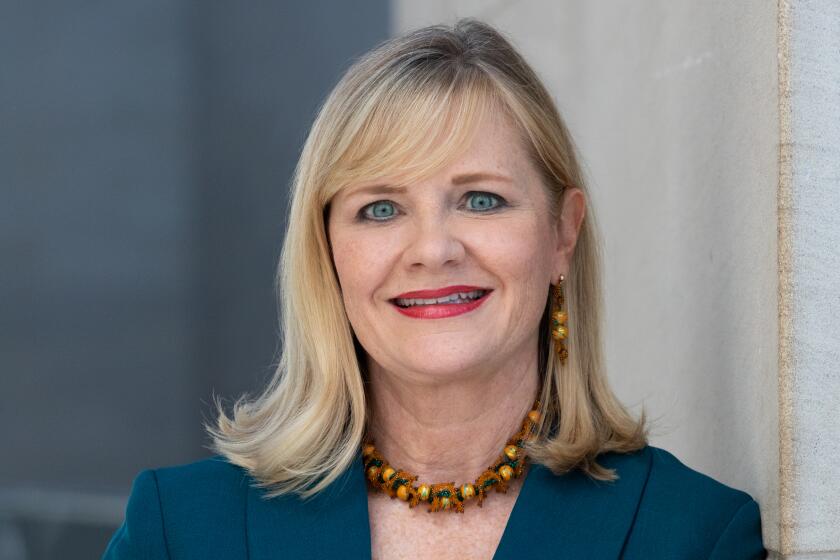Summer eve, Decemberist flourishes
For all their literary references and interest in forgotten fables, the Decemberists are essentially a theatrical band.
So, it was no surprise that the crowd drawn by the Portland, Ore., quintet’s appearance Saturday night at the Hollywood Bowl, where they were accompanied by the Los Angeles Philharmonic, was more demonstrative than the usual no-frills indie-rock audience.
There was the guy dressed in a seersucker suit and straw hat, as if headed to the Kentucky Derby circa 1952, and the couple in shiny evening jackets, dressed, maybe, to hold a seance. And that’s not even counting all the shades of punk glamour -- a ‘50s flamenco dress crossed with pomegranate hair -- and the strong showing of pointy and retro eyeglasses.
The show was the latest in a new Phil tradition that began last year with the appearance of the Scottish group Belle and Sebastian: Take the latest brainy band with an obscure sense of humor and fondness for antiquarian instruments, with a fan base exploding from cult to something large enough to almost fill the 17,000-capacity Bowl, match them with a few up-and-comers and position the orchestra to give rock songs a new dimension.
It may be less formulaic than that, but whatever it is, it seems to be working: Both times, these shows have produced near-sellout crowds -- Saturday’s turnout was just shy of 14,000 -- and roars of approval from the audience.
It seemed to work for the band too: A few songs into the set, lead singer Colin Meloy, who sipped tea with what appeared to be a cinnamon stick instead of pounding beers, mentioned how much better this was than the “hour after hour of trying to reconstruct orchestras in the studio out of one string player.”
The band, whose songs show an interest in sea shanties, Victorian pirates and Celtic mythology, has been developing a fan base since its 2002 debut, “Castaways and Cutouts.”
The highlight of the group’s almost 90-minute set was probably “Los Angeles, I’m Yours,” a backhanded paean to the city, dedicated to Meloy’s recently wed sister Maile, an L.A. novelist. The crowd cheered while he sang of a city whose “hollowness will haunt you” and the orchestra surged with Burt Bacharach-like touches.
Other times, Meloy seemed less comfortable, as when he ran, with an exaggerated gait and a big, embarrassed smile, across the catwalk in front of the stage while singing “Perfect Crime #2.” It was hard not to think that the contract of every band that plays the Bowl includes the clause: “You have to do this, at least once.”
By show’s end, after songs such as “We Both Go Down Together,” “I Was Meant for the Stage” and “Odalisque,” the band collapsed, ironically, under guitar, keyboard and double bass.
The Decemberists would encore with the Dickensian “The Chimbley Sweep,” with Meloy again approaching the catwalk, this time to “mime” a monster behind-the-head guitar solo actually played by another member of the band because, as he noted, “my cable’s not long enough.”
At song’s end, Meloy asked audience members to hoist their cellphones aloft to light up the dark night, saying it reminded him of his ceiling when he was in sixth grade. “You’re free to keep doing that,” he said. “But if you have to make or receive an important call, we understand.”
The two openers were no less eccentric. Band of Horses is an up-and-coming group, based in Seattle and signed to Sub Pop, that sounds one part Built to Spill, two parts Southern rock in songs well-suited to the Bowl’s open setting, which isn’t always the case.
Andrew Bird, a Chicago-based singer-songwriter who played as the sun set, offered a performance that made even the Decemberists look pedestrian.
Performing shoeless before a spinning sculpture of a gramophone, the lanky, violin-playing Bird offered an unlikely pastiche of Appalachian folk, John Zorn and Sergio Leone.
“Sometimes playing for this many people,” Bird said, right before a world-class twitch, “gives you more energy than you can possibly manage.”
More to Read
The biggest entertainment stories
Get our big stories about Hollywood, film, television, music, arts, culture and more right in your inbox as soon as they publish.
You may occasionally receive promotional content from the Los Angeles Times.






